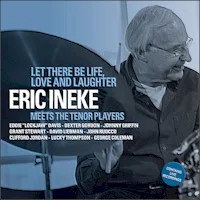Time: 51:30
Size: 117.9 MB
Styles: Bop, Piano jazz
Year: 2011
Art: Front
[4:03] 1. Everything's Coming Up Roses
[5:06] 2. In The Sunshine Of My Funny Valentine's Love
[5:08] 3. West End Boogie
[6:03] 4. You Don't Know What Love Is
[3:54] 5. Lucky To Be Me
[2:33] 6. All The Things You Are
[4:24] 7. Blood Count
[2:38] 8. O.W.
[3:17] 9. Introspection
[5:37] 10. Nutty
[5:08] 11. Brother, Can You Spare A Dime Can't Buy Me Love
[3:32] 12. Bebopicity
Joan Stiles: piano; Joel Frahm: tenor saxophone(1-3, 5-12), soprano saxophone (4); Matt Wilson: drums (1-5, 9-12).
On the surface, Three Musicians is a smart collection of performances from a witty threesome, but closer observation reveals deep Cubist intent. In referencing one of Pablo Picasso's masterpieces, pianist Joan Stiles touches on a style of art that rarely finds an overt entrance into jazz, creating a layered, collage ideology within the very fabric of her work.
The term "mash-up" has become the phrase of choice in pop music circles to describe arrangements that weave two separate songs into a single work of art, but that concept is merely an outgrowth of Synthetic Cubism. While few musicians have tapped into the potential of this primarily visual art form, Stiles finds two different ways to touch on this topic. The obvious creation of combinatorial art comes with the merging of musical materials that takes place when she blends "Brother, Can You Spare A Dime?" with The Beatles' "Can't Buy Me Love," or Cream's "Sunshine Of Your Love" with "My Funny Valentine" ("In The Sunshine Of My Funny Valentine's Love"), but her connection to Cubism also comes to light on a different plane. The very interaction between all three musicians on this date can be viewed as an aural, collage-based representation of what Cubism—and jazz—is all about.
Stiles, drummer Matt Wilson and saxophonist Joel Frahm overlap, contrast, collide and collude with one another in complementary fashion as they create music full of wit, wisdom and wonder that would have made Picasso and Georges Braque gush with pride. They deconstruct and reform Thelonious Monk's work to their liking ("Nutty" and "Introspection"), create music that charms and sparkles with beauty ("Lucky To Be Me"), and bring Stiles' own compositions to life ("West End Boogie" and "Bebopicity"). Much of this ground may have been frequently covered, the trio's ability to bring humor into the mix without resorting to caricature helps set it apart.
The majority of the music touches on a chemistry that exists between all parties, but three mid-album tracks delve deeply into the duo relationship between Frahm and Stiles. "All The Things You Are" is a short journey all about weaving melodic, harmonic and rhythmic elements between two parties, while "O.W." is steeped in bluesy interplay; but the beauty of the bunch is the serious-as-can-be take on Billy Strayhorn's "Blood Count," which proves to be the album's emotional centerpiece.
Those prone to analyzing art can make plenty of connections between Stiles' work and Cubism as a whole, or argue the opposite to their heart's content, but that doesn't really matter. Music matters most, and Stiles clearly gets that. ~Dan Bilawsky
On the surface, Three Musicians is a smart collection of performances from a witty threesome, but closer observation reveals deep Cubist intent. In referencing one of Pablo Picasso's masterpieces, pianist Joan Stiles touches on a style of art that rarely finds an overt entrance into jazz, creating a layered, collage ideology within the very fabric of her work.
The term "mash-up" has become the phrase of choice in pop music circles to describe arrangements that weave two separate songs into a single work of art, but that concept is merely an outgrowth of Synthetic Cubism. While few musicians have tapped into the potential of this primarily visual art form, Stiles finds two different ways to touch on this topic. The obvious creation of combinatorial art comes with the merging of musical materials that takes place when she blends "Brother, Can You Spare A Dime?" with The Beatles' "Can't Buy Me Love," or Cream's "Sunshine Of Your Love" with "My Funny Valentine" ("In The Sunshine Of My Funny Valentine's Love"), but her connection to Cubism also comes to light on a different plane. The very interaction between all three musicians on this date can be viewed as an aural, collage-based representation of what Cubism—and jazz—is all about.
Stiles, drummer Matt Wilson and saxophonist Joel Frahm overlap, contrast, collide and collude with one another in complementary fashion as they create music full of wit, wisdom and wonder that would have made Picasso and Georges Braque gush with pride. They deconstruct and reform Thelonious Monk's work to their liking ("Nutty" and "Introspection"), create music that charms and sparkles with beauty ("Lucky To Be Me"), and bring Stiles' own compositions to life ("West End Boogie" and "Bebopicity"). Much of this ground may have been frequently covered, the trio's ability to bring humor into the mix without resorting to caricature helps set it apart.
The majority of the music touches on a chemistry that exists between all parties, but three mid-album tracks delve deeply into the duo relationship between Frahm and Stiles. "All The Things You Are" is a short journey all about weaving melodic, harmonic and rhythmic elements between two parties, while "O.W." is steeped in bluesy interplay; but the beauty of the bunch is the serious-as-can-be take on Billy Strayhorn's "Blood Count," which proves to be the album's emotional centerpiece.
Those prone to analyzing art can make plenty of connections between Stiles' work and Cubism as a whole, or argue the opposite to their heart's content, but that doesn't really matter. Music matters most, and Stiles clearly gets that. ~Dan Bilawsky
Three Musicians




















